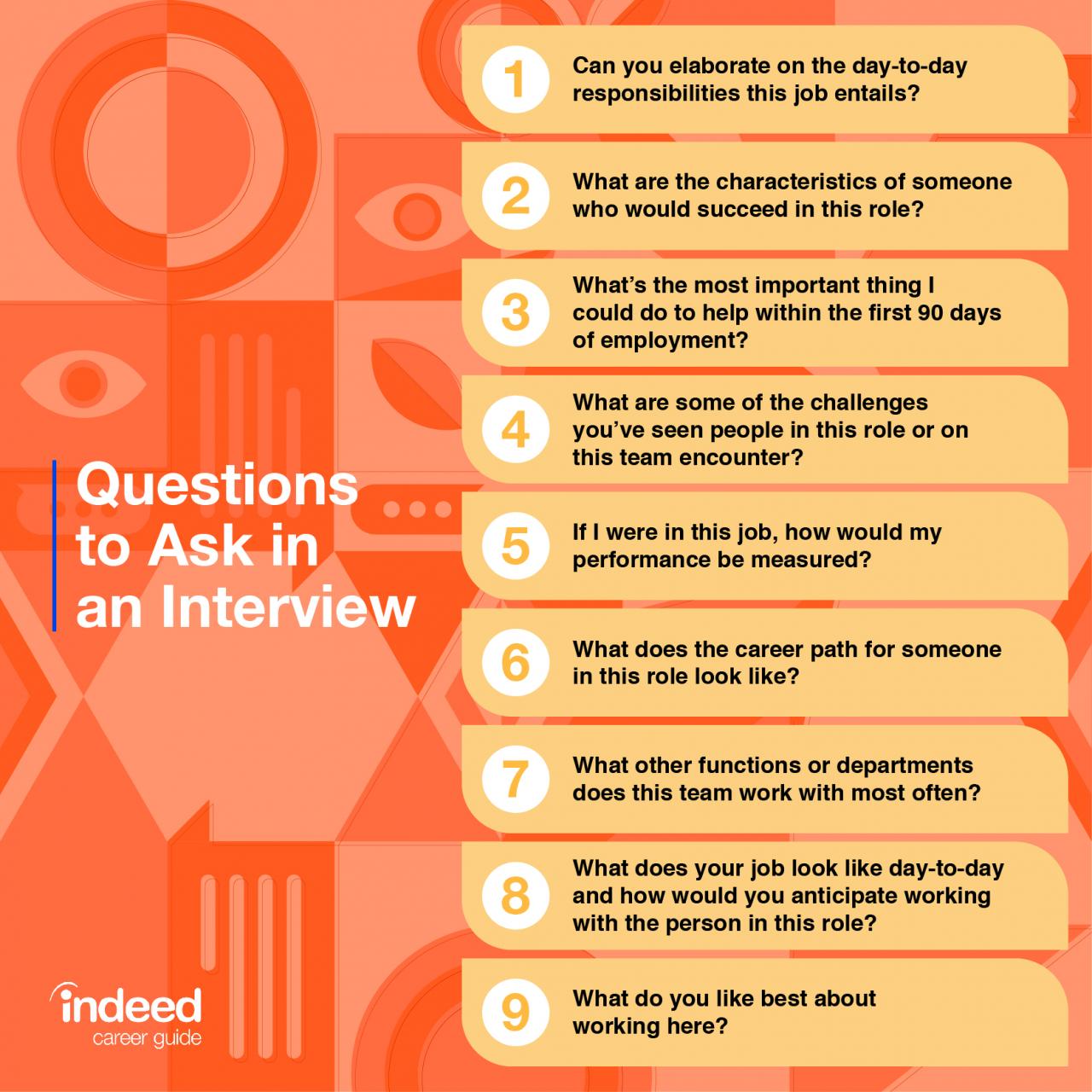Best questions to ask in an interviewer – Prepare to conquer your next interview with the ultimate guide to asking the best questions. From navigating different question types to crafting thoughtful inquiries, this comprehensive guide will empower you to uncover crucial insights and leave a lasting impression. Dive into the world of effective interviewing and unlock the secrets to a successful job search.
Asking the right questions in an interview is not just about gathering information; it’s about showcasing your genuine interest, understanding the company culture, and assessing the role’s alignment with your career aspirations. By mastering the art of inquiry, you can turn the tables and gain valuable knowledge that will help you make an informed decision about your future.
Best Questions to Ask in an Interview

Asking thoughtful questions in an interview is essential for assessing company culture, understanding the role, and evaluating career growth opportunities. This guide will provide a comprehensive overview of the types of questions to ask, how to prepare, and what to avoid.
Types of Questions to Ask
Interviewers ask various types of questions to gauge candidates’ skills, experience, and fit for the role. These include:
- Open-ended questions:Allow candidates to provide detailed answers, such as “Tell me about your experience with project management.”
- Closed-ended questions:Have specific answers, such as “How many years of experience do you have in this field?”
- Situational questions:Ask candidates how they would handle hypothetical situations, such as “Describe a time when you faced a conflict with a colleague.”
- Behavioral questions:Focus on candidates’ past behaviors and how they align with the company’s values, such as “Give me an example of a time when you demonstrated teamwork.”
Questions to Prepare
Candidates should prepare thoughtful and relevant questions to ask the interviewer. These questions can help:
- Gain insights into the company culture and values
- Understand the specific role and its responsibilities
- Assess opportunities for professional development and advancement
When crafting questions, consider the following tips:
- Be specific and avoid general questions.
- Research the company and the role beforehand.
- Tailor questions to your interests and qualifications.
Questions to Avoid
Certain questions are inappropriate or unprofessional to ask in an interview. These include:
- Questions about personal life:Such as age, marital status, or family plans.
- Questions about salary or benefits:Unless specifically prompted by the interviewer.
- Questions that are too specific or technical:Unless you have the necessary expertise.
- Questions that are negative or accusatory:Such as “Why did you fire your last employee?”
Questions to Help Assess Company Culture, Best questions to ask in an interviewer
Asking questions about company culture can provide valuable insights into the work environment. Consider asking:
- “What are the company’s core values?”
- “Can you describe the work-life balance here?”
- “What are the opportunities for professional development?”
Understanding the company culture is crucial for determining if the position is a good fit.
Questions to Ask About the Role
Questions about the role can help candidates determine its responsibilities and expectations. Ask:
- “What are the key responsibilities of this position?”
- “What are the short-term and long-term goals for this role?”
- “How will my performance be evaluated?”
These questions help candidates assess if the role aligns with their skills and career aspirations.
Questions to Ask About Career Growth
Questions about career growth demonstrate your ambition and interest in the company’s future. Consider asking:
- “What are the opportunities for advancement within the company?”
- “How does the company support professional development?”
- “What are the long-term career paths for employees in this role?”
These questions help candidates plan their long-term career goals and determine if the company offers the growth potential they seek.
Final Summary: Best Questions To Ask In An Interviewer
Remember, the best questions to ask in an interview are those that demonstrate your preparation, curiosity, and enthusiasm for the role. By following the tips and guidance Artikeld in this guide, you can confidently navigate the interview process, gather essential information, and make a strong impression that will set you apart from other candidates.
So, embrace the power of inquiry, ask the right questions, and take control of your interview destiny.
Detailed FAQs
What types of questions should I prepare to ask an interviewer?
Prepare a mix of open-ended, closed-ended, situational, and behavioral questions. Open-ended questions allow you to explore the interviewer’s perspectives, while closed-ended questions seek specific information. Situational and behavioral questions assess your problem-solving abilities and past experiences.
How can I craft thoughtful and relevant questions?
Research the company and the role you’re applying for. Identify areas where you need more information or clarification. Frame your questions in a professional and respectful manner, ensuring they align with your career goals and interests.
What questions should I avoid asking in an interview?
Avoid asking questions that are too personal, unrelated to the job, or could be perceived as unprofessional. Questions about salary or benefits should generally be reserved for later stages of the interview process.
Why is it important to ask questions about company culture?
Understanding the company culture is crucial for assessing whether the organization is a good fit for your values and work style. Questions about the company’s mission, values, and work environment can provide valuable insights into the organization’s dynamics.
How can questions about career growth help me plan my future?
Asking about opportunities for professional development and advancement demonstrates your ambition and commitment to growth. These questions can help you gauge the company’s investment in employee development and identify potential pathways for your future career.